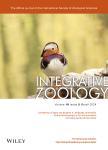Effects of sun compass error on spatial search by Clark’s nutcrackers
作者机构:Department of PsychologyUniversity of ManitobaWinnipegCanada Department of Biological SciencesMacquarie UniversitySydneyAustralia Department of Biological SciencesNorthern Arizona UniversityFlagstaffUSA Department of Biological SciencesUniversity of Nebraska-LincolnLincolnUSA
出 版 物:《Integrative Zoology》 (整合动物学(英文版))
年 卷 期:2019年第14卷第2期
页 面:172-181页
核心收录:
学科分类:0710[理学-生物学] 08[工学] 0905[农学-畜牧学] 0906[农学-兽医学] 0812[工学-计算机科学与技术(可授工学、理学学位)]
基 金:a Natural Sciences Research Council grant RGPIN/312379-2009 to DMK and a National Institutes of Health grant MH-61810 to AK.
主 题:Clark’s nutcracker clock-shift error landmarks sun compass
摘 要:Animals employ compasses during navigation,but little attention has been paid to how accuracy is maintained in the face of compass error,which is inevitable in biological systems.The use of multiple landmarks may minimize the effect of compass error.We allowed Clark’s nutcrackers to cache seeds in an outdoor aviary with either one or four landmarks present,and subsequently subjected them to small clock-shifts mimicking the effects of compass error.As predicted,the results showed a significant decrease in search accuracy following the clock-shift when one landmark was present but not when four landmarks were present.These results support that nutcrackers encode information from the sun as well as terrestrial landmarks,and these spatial cues are used in a flexible manner.Overall,our results are important as they support the hypothesis that multiple landmarks may be used during situations where the sun compass has even a small amount of error.



